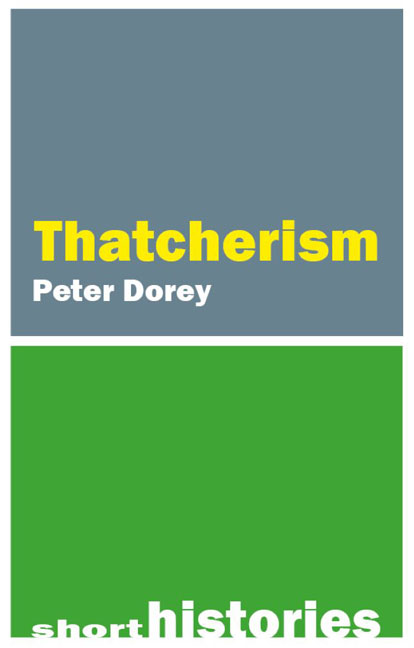Book contents
- Frontmatter
- Contents
- Preface
- 1 Why Margaret Thatcher Became Conservative Party Leader and Prime Minister
- 2 The Development of Thatcherism: Intellectual Origins and Ideological Framework
- 3 The Key Policies
- 4 Thatcher's Management and Domination of the Parliamentary Conservative Party
- 5 The Thatcherization of the Conservative Party Since 1990
- 6 The Contradictions and Consequences of Thatcherism
- Concluding Comments
- Chronology
- References
- Index
2 - The Development of Thatcherism: Intellectual Origins and Ideological Framework
Published online by Cambridge University Press: 23 January 2024
- Frontmatter
- Contents
- Preface
- 1 Why Margaret Thatcher Became Conservative Party Leader and Prime Minister
- 2 The Development of Thatcherism: Intellectual Origins and Ideological Framework
- 3 The Key Policies
- 4 Thatcher's Management and Domination of the Parliamentary Conservative Party
- 5 The Thatcherization of the Conservative Party Since 1990
- 6 The Contradictions and Consequences of Thatcherism
- Concluding Comments
- Chronology
- References
- Index
Summary
As we have seen, Thatcher was not yet a Thatcherite when elected as Conservative leader in February 1975, and even by 1979, some of her political ideas were still developing, although her ideological inclination was clearly evident. Thatcherism developed incrementally, in a step-by-step manner, although her strides became longer and quicker as her confidence grew, particularly when she also realized how ineffective her political opponents were, both inside the Conservative Party, and beyond. Thatcherism derived from an eclectic array of individual, institutional and intellectual sources, as well as being facilitated, and in some respects lent credence or credibility, by circumstances and events.
Her disillusionment with the 1970–74 Heath government (in which she had been education secretary) naturally prompted her reconsideration of British Conservatism, and in undertaking this critical reflection, she was strongly influenced and encouraged by the similarly disillusioned Keith Joseph, who introduced her to the key intellectual sources of neoliberalism: Milton Freidman, Friedrich Hayek and Adam Smith. Thatcher already instinctively or intuitively agreed with many of their ideas, but under Joseph's tutelage, and through reading the texts of these neoliberal economists and political theorists, her beliefs became more systematic and substantive.
These ideas were also being proselytized in the 1970s by free-market think tanks such as the Adam Smith Institute, established in 1977 (Pirie 2012), and the Institute of Economic Affairs, the latter formed in 1955, but acquiring much greater prominence and credence in the context of the serious economic problems facing Britain in the 1970s (Seldon 1981; Desai 1994). Of course, Thatcher, Joseph and Sherman also formed, in 1974, their own think tank, the Centre for Policy Studies, which promoted what subsequently became Thatcherism. These three think tanks are still active today. The quest for a new or true Conservatism
It was after Edward Heath's Conservative government had lost the February 1974 general election (followed by another Conservative defeat in that year's October general election) that Keith Joseph had his Damascene conversion to what he now considered to be true Conservatism: “it was only in April 1974 that I was converted to Conservatism. I had thought that I was a Conservative, but I now see that I was not really one at all” (Joseph 1975: 4).
- Type
- Chapter
- Information
- Thatcherism , pp. 23 - 50Publisher: Agenda PublishingPrint publication year: 2023



